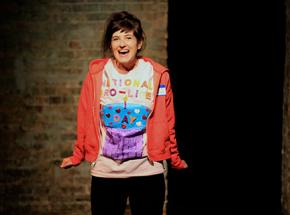Shining a bright light on the bigots
The play MOM BABY GOD takes an inside look on the Religious Right and their crusade to squelch a woman's right to abortion.
ON STEPPING into the theater lobby, you're greeted by a teenage girl with a high pigtail and a bright homemade T-shirt with a cupcake on it. In her intensely excitable teeny-bopper voice, Jessica asks, "Do you like cupcakes? Do you like birthdays?" as she hands you a nametag and welcomes you to the Students for Life of America Conference.
After replying yes to both (who doesn't like cupcakes?), she disappears and returns seconds later, with cupcakes in hand. Still in her sweet shrill voice, she hands them over and says, "Did you know one in every three babies doesn't get to have a birthday because of abortion? Pass it on to someone you know!"
Jessica is the protagonist of the one-woman play called MOM BABY GOD, written and performed by Madeline Burrows. After two years of immersive research inside the pro-life movement, Burrows based the play's characters very closely on the real people she met and interviewed along the way.
The performance evolved from a documentary-style performance of her research into a narrative story that follows Jessica through two days at a conference being held at her parents' crisis pregnancy center, where the talking heads of the anti-abortion movement come to speak and rally youth around their cause.

Burrows' show feels more like a piece of performance art rather than theater, as it invites the audience into the conference with chants and conference participation. She masterfully transforms into multiple different characters and captivates the audience by conveying each character with such authenticity that it's hard to imagine there's just one person on stage.
Burrows uses her voice, diction and body language to make the transitions from one character into the next distinct and immediate.
Throughout the conference, its organizers and speakers each have their own compelling way to pull us into the anti-abortion movement. Chants mimicking the recent Occupy movement's "We! Are! The 99 Percent!" pound through the audience with "We! Are! The pro-life generation!"
Repeated touching facts give life to unborn fetuses (always referred to as babies) when we hear "Babies have heart beats before moms know they're pregnant" and "When a mom hears her baby's heart beat, 9 times out of 10 she chooses life." The clinic hosting the conference raises money by asking the participants to give just $420 per life, and leads the crowd in a "Happy Birthday" song to all the babies we are saving.
THOUGH THE main character Jessica often feels over-the-top with her enthusiasm for all things pro-life, she also personifies the experience every teenager has when they are exposed to ideas that fascinate, influence and then shape the person we grow into.
As you follow Jessica through the conference, you are inundated with the messages she is given and how they conflict with the discovery she is going through about her own sexuality. Cute boys and celebrities ignite her desires, and outspoken "radical" women inspire her.
The depth and intensity that these contradictions play in her life becomes so real that the play leaves you shaken by the competing impacts they play on her psyche. The audience is practically brought to tears as you feel the pull and push of the forces at play in her world.
What is stifling to grapple with is that these characters and stories are real. As one audience member pointed out in the discussion period after the performance ended, Burrows didn't exaggerate what she saw in the pro-life movement.
Girls today are constantly inundated with conflicting messages like the ones that MOM BABY GOD perpetuates. That they should be unreasonably thin, but wear push-up bras. They are pressured to be sexually available, but are accused of drinking too much or wearing the wrong outfit when they are raped. They are told to take ownership over their own bodies, but sexual education steers toward abstinence.
Burrows depicts a range of voices, from the pro-life feminist to the story-telling reverend. Each perspective within the pro-life movement is unapologetic and clear in their message.
MOM BABY GOD immerses its audience in the urgency with which the pro-life movement needs to be taken on. It shows us the effectiveness of that movement and probes us to ask ourselves how we can challenge it. In the absence of a movement to challenge the rising right-wing voice against abortion, the voices depicted in this play are the voices winning out.
We need to respond with the same clarity, but based in the reality of the teenage experience: that teens will have sex, and they will get pregnant. We need to let girls know that sex is one of life's pleasures, not something to be afraid of--and that having confidence and taking control of your own body means both making thoughtful decisions about your sex life and using birth control in whatever form you choose.
Women need a health care system that supports their choices and doesn't stigmatize the realities they are facing.


